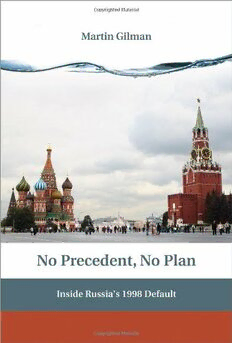
No Precedent, No Plan: Inside Russia's 1998 Default PDF
355 Pages·2010·0.93 MB·English
Most books are stored in the elastic cloud where traffic is expensive. For this reason, we have a limit on daily download.
Preview No Precedent, No Plan: Inside Russia's 1998 Default
Description:
In 1998, President Boris Yeltsin's government defaulted on Russia's debts and the country experienced a financial meltdown that brought its people to the brink of disaster. In No Precedent, No Plan, Martin Gilman offers an insider's view of Russia's financial crisis. As the senior representative of the International Monetary Fund in Moscow beginning in 1996, Gilman was in the eye of the storm. Now, he tells the dramatic story of Russia's economic evolution following the collapse of the Soviet Union and analyzes the 1998 crisis and its aftermath. Gilman argues that the default and collapse, although avoidable, actually spurred Russia to integrate its economy with the rest of the world's and served as a harbinger of the recent global economic crisis. Gilman details the IMF's involvement and defends it against criticism by economist Joseph Stiglitz and others. In the 1990s, the collapse of the Soviet Union left Russia in chaos, with a barely functioning government and no consensus on the path toward a democratic and economic transformation. The smooth transition to a market economy that had been accomplished in other countries in Eastern Europe was impossible. Gilman describes the ordeal of the 1998 crisis and argues that the IMF helped Russia avoid an even greater catastrophe. He recounts Russia's emergence from the IMF's tutelage and explains how the shell-shocked Russian public turned to Vladimir Putin in search of stability after the trauma of 1998. No Precedent, No Plan offers a definitive account--the first from an insider's perspective--of Russia's painful transition to a market economy.
See more
The list of books you might like
Most books are stored in the elastic cloud where traffic is expensive. For this reason, we have a limit on daily download.
